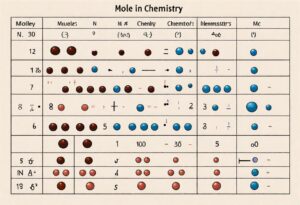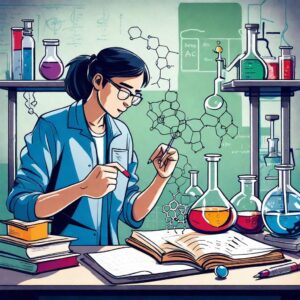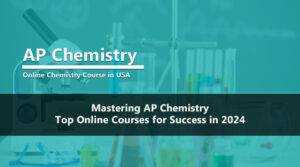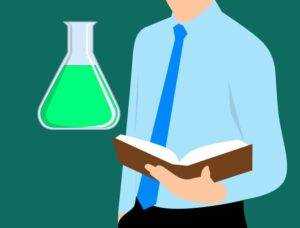Learn about the parts of atoms and how scientists classify them.
This is like understanding the alphabet of chemistry!
Topics may include:
- Intermolecular forces
- Solids, liquids, and gases
- Kinetic molecular theory
- Solutions and mixtures
- Photoelectric effect
- On The Exam
On The Exam
18%–22% of exam score
Unit 2 : Molecular and Ionic Compound Structure and Properties
Discover different ways atoms form bonds and how these bonds affect the resulting molecules. Imagine different types of glue and how they hold things together differently.
Topics may include:
- Types of chemical bonds
- Intramolecular force and potential energy
- Structure of ionic solids
- Structure of metals and alloys
- Lewis diagrams
- Resonance and formal charge
- VSEPR and bond hybridization
On The Exam
7%–9% of exam score
Unit 3 : Intermolecular Forces and Properties
Explore the invisible forces between tiny particles that determine whether something is a solid, liquid, or gas.
Imagine how close dancers stand depending on the music!
Topics may include:
- Intermolecular forces
- Solids, liquids, and gases
- Kinetic molecular theory
- Solutions and mixtures
- Photoelectric effect
On The Exam
18% – 22% of exam score
Unit 4 : Chemical Reactions
Learn how to tell if something is a physical or chemical change and how to write equations to show what happens in a chemical reaction. This is like following a recipe for a chemical transformation!
Topics may include:
- Introduction for reactions
- Net ionic equations
- Representations of reactions
- Physical and chemical changes
- Stoichiometry
- Types of chemical reactions
On The Exam
7%–9% of exam score
Unit 5 : Chemical Kinetics
Discover how to measure how quickly a reaction happens and what factors can speed it up or slow it down. Imagine racing cars – some are naturally faster, and some tracks make them go faster or slower.
Topics may include:
- Reaction rate
- Introduction to rate law
- Elementary reactions
- Collision model
- Introduction to reaction mechanisms
- Multistep reaction energy profile
- Catalysis
On The Exam
7%–9% of exam score
Unit 6: Thermodynamics
Learn about energy changes in reactions, like absorbing or releasing heat. Imagine building a fire – it releases heat energy!
Topics may include:
- Endothermic and exothermic processes
- Heat transfer and thermal equilibrium
- Heat capacity and calorimetry
- Energy of phase changes
- Introduction to enthalpy of reaction
- Enthalpy of formation
- Hess’s law
On The Exam
7%–9% of exam score
Unit 7: Equilibrium
Explore how chemical reactions reach a happy medium where things stop changing. Imagine a seesaw that finds its balance point.
Topics may include:
- Introduction to equilibrium
- Calculating the equilibrium constant
- Calculating equilibrium concentrations
- Introduction to Le Châtelier’s principle
- Introduction to solubility equilibria
- pH and solubility
- Free energy of dissolution
On The Exam
7%–9% of exam score
Unit 8: Acids and Bases
Learn about pH, a measure of acidity, and how acids and bases interact. Imagine baking soda (a base) neutralizing vinegar (an acid) during a science experiment!
Topics may include:
- Introduction to acids and bases
- pH and pOH of strong acids and bases
- Acid-base reactions and buffers
- Molecular structure of acids and bases
- pH and pKa
- Properties of buffers
On The Exam
11%–15% of exam score
Unit 9: Applications of Thermodynamics
See how the concepts from all the other units come together to understand how likely a reaction is to occur and how it can be used in things like batteries. This is like using all your knowledge of ingredients and cooking techniques to create delicious meals!
Topics may include:
- Introduction to entropy
- Gibbs free energy and thermodynamic favorability
- Thermodynamic and kinetic control
- Free energy and equilibrium
- Galvanic (voltaic) and electrolyte cells
- Electrolysis and Faraday’s law
On The Exam
7%–9% of exam score







